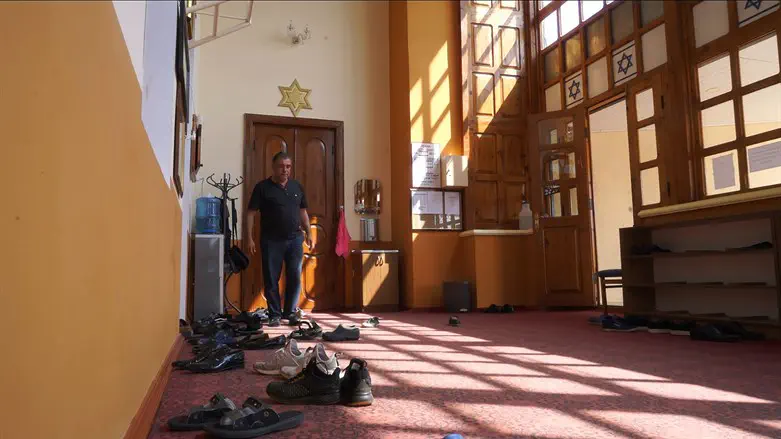
In Baku, there are three synagogues, one servicing Mountain Jews, one servicing Georgian Jews and one servicing Ashkenazi Jews. I prayed at the Ashkenazi Synagogue and was able to have a nice Shabbat dinner with a local Jewish Azerbaijani rabbi, Rabbi Zamir Isayev and his family. According to Rabbi Isayev, Chabad routinely offers Jewish travelers in Baku a place to have a Shabbat dinner: “Anyone who wants to get kosher food can have it.” I also found that both Baku and the International Food Festival in Shusha had plenty of vegetarian options for Jewish travelers who did not want to eat non-Kosher meat.
Rabbi Zamir Isayev also recounted that there are a number of nice places in Azerbaijan for Jewish travelers to visit, such as the Mountain Jewish Museum in Guba, the historic synagogues in Guba and Baku, the mikvah bath in Guba, and more. According to Rabbi Isayev, there are a number of descendants of the Baal Shem Tov who are buried in Baku: “There is also an ancient synagogue in the Ismaliya region. In Oguz, there are two old synagogues.”
Ilham Aliyev, the President of the Republic of Azerbaijan, once said: "Azerbaijan has done a lot of work for multiculturalism. Azerbaijan proves that multiculturalism is alive, despite some politicians claiming that multiculturalism has failed. Maybe it has failed elsewhere. But it is alive in Azerbaijan and these tendencies and ideas are getting stronger and receiving more support from the public. We will continue on this path.”
Due to the multi-culturalism policy pursued by the late Azerbaijani President Heydar Aliyev and his successor President Ilham Aliyev, Azerbaijan today is a multi-cultural society. Although the majority of the population is Muslim, there are also 400,000 Christians, 50,000 Jews, and a Bahai community as well in the country. Zoroastrianism is also highly regarded in Azerbaijan, with Novruz being a national holiday for the nation. Furthermore, the Heydar Aliyev Mosque in Baku is the only mosque in the world where Sunnis and Shias pray together in unison.
Azerbaijan’s national leader Heydar Aliyev once said: “The multi-nationality of the Azerbaijani population is our wealth, our advantage. We value and will always preserve that.” His political vision had an important role in Azerbaijan’s development, which led to the creation of a nation that prides itself on celebrating religious and ethnic differences as a source of national pride. He led the nation towards an official state policy that seeks to support every ethnic and religious group in the country, believing that celebrating all ethnicities and religions together is what makes us great.
Azerbaijan does not seek to assimilate its minorities like America and Europe in the past. Rather, they accept them the way that they are, viewing their culture and faith to be a valuable contribution to the country.
For this reason, it is very pleasant to travel to Azerbaijan as a Jewish person. Unlike in America and many places in Europe, Jews can feel free to wear traditional religious clothing and to wear Magen David necklaces in Azerbaijan. While Jewish students in America have to pay a fortune to go to private Jewish schools to learn Hebrew and to conduct Jewish funerals, all of these things are subsidized by the government in Azerbaijan. This makes it much easier for Azerbaijani Jews to maintain a Jewish life. In fact, when I went to Guba, I was surprised that many of the local Jews spoke better Hebrew than I, someone who has lived in Israel since 2009. This is because there, they study Hebrew from youth, instead of beginning to study the language in college at age 20.
Today’s Azerbaijan is a secular state. Article 48 of its Constitution ensures the liberty of worship, to choose any faith, or to not practice any religion, and to express one’s view on the religion. Azerbaijan was the first Muslim country to provide women the right to vote. Women in Azerbaijan were granted the right to vote in 1918, which was even before the United States and most of Europe. The granting of women the right to vote in Azerbaijan before most other places occurred because of the open-minded nature of Azerbaijani society.
After all, Azerbaijan is a country where most of the population celebrates Passover, Easter and Novruz in unison, wishing the members of each faith community greetings on their holidays and celebrating with each of them, as they view diversity to be a great asset that enriches their country. Azerbaijan’s Nobel Prize winning physicist Lev Landau was Jewish, as was the physicist Gavril Ilizorov, the pianist Bella Davidovich, the writer Ella Leya, the chess grandmaster Emil Sutovsky, and more.
Jews who visit Azerbaijan can be sure of feeling welcome and secure as they explore this amazing country.
Rachel Avraham is the editor of the Economic Peace Center, which was established by former Israeli Communication Minister Ayoob Kara. She is also the author of “Women and Jihad: Debating Palestinian Female Suicide Bombings in the American, Israeli and Arab Media.”
